This website uses cookies so that we can provide you with the best user experience possible. Cookie information is stored in your browser and performs functions such as recognising you when you return to our website and helping our team to understand which sections of the website you find most interesting and useful.
The conference co-organised by the City of Bordeaux and Climate Chance, in partnership with Cités Unies France (CUF) and Association Internationale des Maires Francophones (AIMF), was held on 27 September 2024 at Bordeaux.
The aim of the presentations and discussions, led by a panel of experts and players on the ground, was to take stock, a few weeks before COP16 Biodiversity, of the major issues that will be at the heart of the discussions in Cali, particularly in terms of ecological connectivity, and to encourage the emergence of opportunities for the sustainable development of innovative cooperation programmes based on South/North and North/South reciprocity. It will also be an opportunity to review France’s international action in the field of conservation.
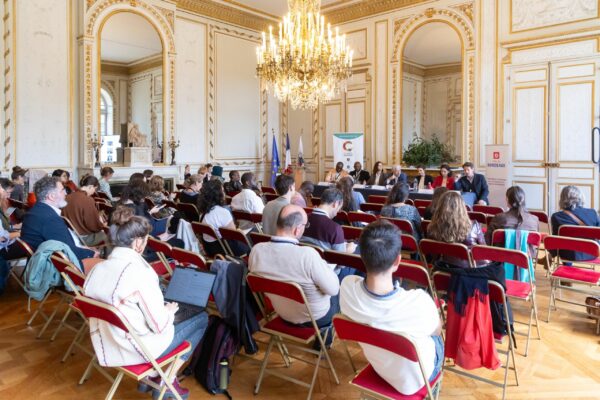
Programme
3 Roundtables
- International action by local authorities & biodiversity
- Climate finance: the role of biodiversity credits
- Two years after the Kunming-Montreal agreement: what are the challenges for the COP16 Biodiversity in Cali and what is the role of Guineans and French actors?
1 High-level Closing Plenary
- In the run-up to COP16 Biodiversity, what lessons can be drawn from the first initiatives aimed at converging climate and biodiversity issues in Africa?
Walking Lunch and Networking
Detailed programme and speakers
Welcome Message
⏰ 10AM – 10:30AM (CEST)
A welcome message by Ms Céline Papin, Deputy Mayor in charge of Regional, European and International Cooperation, Higher Education and Research, and Mr Ronan Dantec, Senator for Loire Atlantique and President of the Climate Chance Association.
Roundtable 1: International action by local authorities & biodiversity
⏰ 10:30AM – 12PM (CEST)
Today, the visible impacts of climate change and biodiversity loss represent a major challenge for local and regional authorities. We need to combine global adaptation and conservation efforts and harmonise our local policies for the benefit of local populations. In this context, it is crucial to look at the most appropriate tools available to local and regional authorities to meet these challenges. Decentralised cooperation, which involves partnerships between local authorities in different countries, is proving particularly effective. In Africa, for example, experience with this has shown that decentralised cooperation can be a catalyst for expertise to benefit biodiversity and the climate. This round table explores how these partnerships facilitate the sharing of knowledge and technologies, and the implementation of concrete projects to promote biodiversity-climate resilience.
Speakers:
- Mamadou Diawara, Executive Director, Guinée Ecologie
- SEYDI Adja Aissatou SY, Coordinator, l’Observatoire des aires Protégées de l’Afrique de l’Ouest, Sénégal (OBAPAO)
- Virginie Bineau, Director, Guinée44
- Mathilde Leymarie, Project Manager LIFE Biodiversité, Bordeaux Métropole
- Michèle Rubirola, Vice-president, Cités Unies France, First Deputy Mayor of Marseille
- Ronan Dantec, Senator for Loire Atlantique and President of Climate Chance
- Virginie Rouqette, General manager, Cités Unies France (moderator)
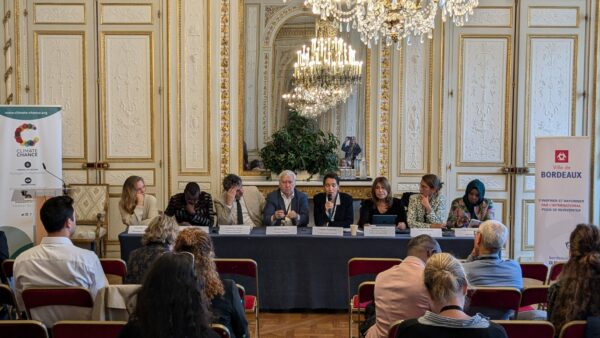
Lunch Break
⏰ 12PM – 2PM (CEST)
Walking Lunch.
Roundtable 2: Climate finance: the role of biodiversity credits
⏰ 2PM – 3:30PM (CEST)
Although the voluntary market in biodiversity credits is still developing, it offers a major opportunity to finance actions offering climate and biodiversity co-benefits, to finance conservation actions and to integrate the protection of ecosystems into economic practices. The aim of this round table is to discuss the prospects and challenges of the biodiversity credit market, which has yet to be defined. Several questions are on the table: should biodiversity credits be integrated into the existing carbon market to benefit from its infrastructure? Or should a separate market be created to maximise their impact and specificity? What lessons can be learned from carbon markets for biodiversity markets to avoid making the same mistakes? What synergies are needed between carbon and biodiversity markets to maximise climate and biodiversity co-benefits? There are several challenges regarding biodiversity credits, including developing robust standards for assessing and certifying biodiversity credits and maximising co-benefits for local communities and the environment. This round table will aim to provide some tangible answers.
Speakers:
- Amandine Hersant, Director, Planète Urgence
- Matthieu Wemaere, Lawyer, Consultant to the Global Environment Facility (GEF) on the governance of biodiversity credits
- Caroline Sourzac Lami, Finance and Biodiversity Advocacy Officer, WWF France
- Alain Guy Tanefo, New markets director & Cheick Bah, In charge of operations, West Africa Blue
- Emilie Alberola, Associate Director Southern Europe, EcoAct
- Ronan Dantec, Senator for Loire Atlantique and President of Climate Chance (Moderator)
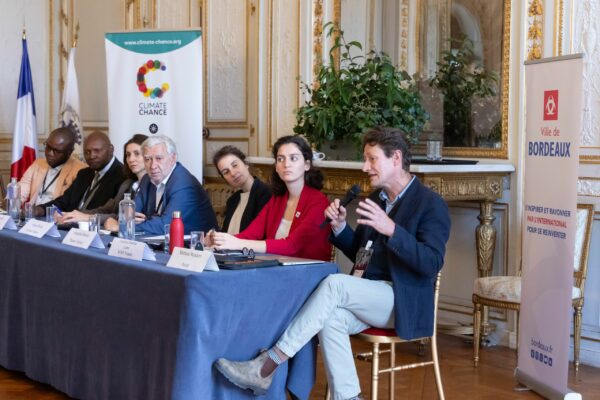
Roundtable 3: Two years after the Kunming-Montreal agreement: what are the challenges for the COP16 Biodiversity in Cali and what is the role of Guineans and French actors?
⏰ 3:30PM – 5PM (CEST)
Two years after the historic Kunming-Montreal agreement at the COP15 in Montreal, the COP16 in Cali must transform these global commitments into concrete action. Countries will have to demonstrate the ways in which they align their national biodiversity strategies with the ambitious objectives of the Kunming-Montreal framework. The mobilisation of financial resources, needed to make up a shortfall of 700 billion dollars a year, will be a central point of the discussions, with particular emphasis on innovative financing mechanisms. Discussions will also focus on the equitable sharing of the benefits derived from genetic resources and the importance of the rights of indigenous peoples in the conservation of biodiversity. These issues will provide an opportunity to measure progress since Montreal and to strengthen collective action to protect the world’s biodiversity. The aim of this round table is to debate these issues and to consider the progress made in multi-level action to achieve the objectives of the Kunming-Montreal framework.
Speakers:
- SEYDI Adja Aissatou SY, Coordinator, l’Observatoire des aires Protégées de l’Afrique de l’Ouest, Sénégal (OBAPAO)
- Marie-Cécile Thirion, Deputy Head of the Agriculture, Rural Development and Biodiversity Division, AFD
- Alois Aguettant, Biodiversity and Nature-based Solutions Officer, French Water Partnership
- Ronan Dantec, Senator for Loire Atlantique and President of Climate Chance (Moderator)
Launch of the International Biodiversity Corridors Coalition website
⏰ 5:20PM – 5:30PM (CEST)
Presentation of the progress of the International Coalition on Biodiversity Corridors in Africa by Ronan Dantec, Senator for Loire Atlantique, President of Climate Chance.
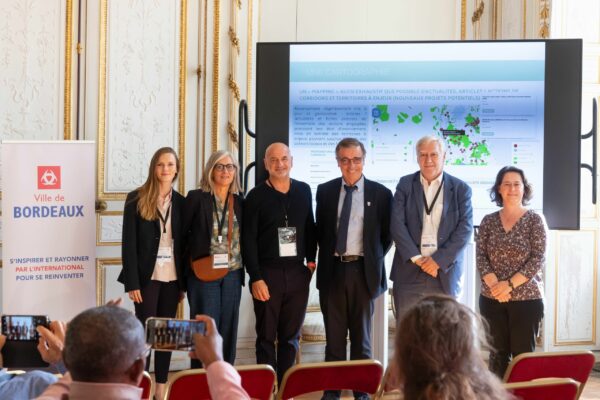
Closing Plenary: In the run-up to COP16 Biodiversity, what lessons can be drawn from the first initiatives aimed at converging climate and biodiversity issues in Africa?
⏰ 5:30PM – 6:30PM (CEST)
The COP16 on biodiversity, occuring from the 21st of October to the 1st of November 2024 in Cali, Colombia, will serve as a test for the world’s decision-makers. Will it enable them to complete the decisions that were not finalised at the previous COP? A wide range of issues remain unresolved, such as global stocktaking, international financing, benefit-sharing from digitised genetic resources, standardised indicators for monitoring the implementation of targets, etc. The stakes are high and the negotiations will be intense. The aim of this closing plenary is to discuss the latest progress made over the last two years in Europe and Africa through a cross-continental perspective, and focus on the convergence of the climate and biodiversity agendas as well as the role of civil society in implementing the objectives of the global framework.
Speakers:
Opening remarks by Agnès Pannier-Runacher, Minister of Ecological Transition, Energy, Climate and Risk Prevention
- SEYDI Adja Aissatou SY, Coordinator, l’Observatoire des aires Protégées de l’Afrique de l’Ouest, Sénégal (OBAPAO)
- Pierre Hurmic, Mayor of the City of Bordeaux
- Ronan Dantec, Senator for Loire Atlantique and President of Climate Chance
- Aboubacar Samoura, Director General of the Guinean Office of National Parks and Wildlife Reserves, representative of the Ministry of the Environment and Sustainable Development of Guinea
- Rozenn Diallo, Senior Lecturer in Political Science, Sciences Po Bordeaux (Moderator)
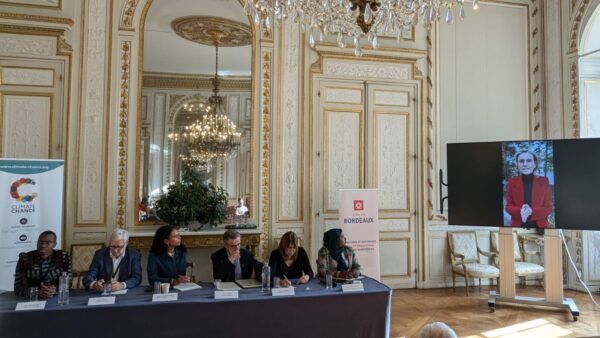
Networking Cocktail
⏰ 6:30PM – 7:30PM (CEST)

